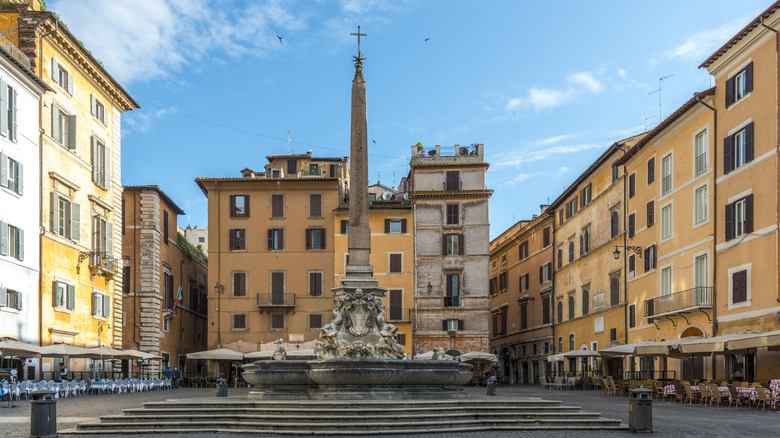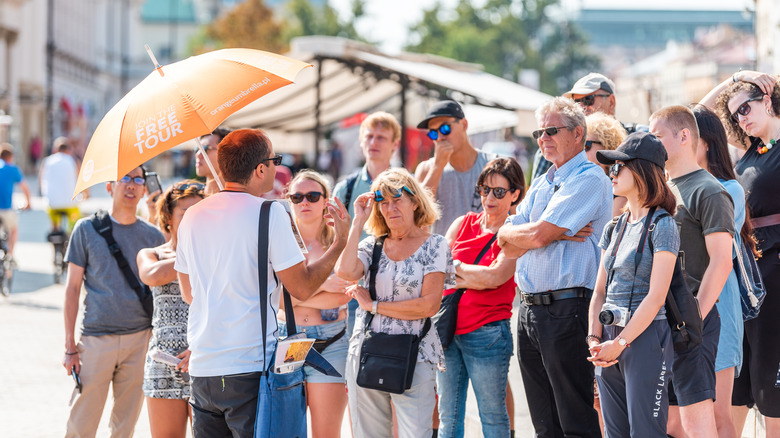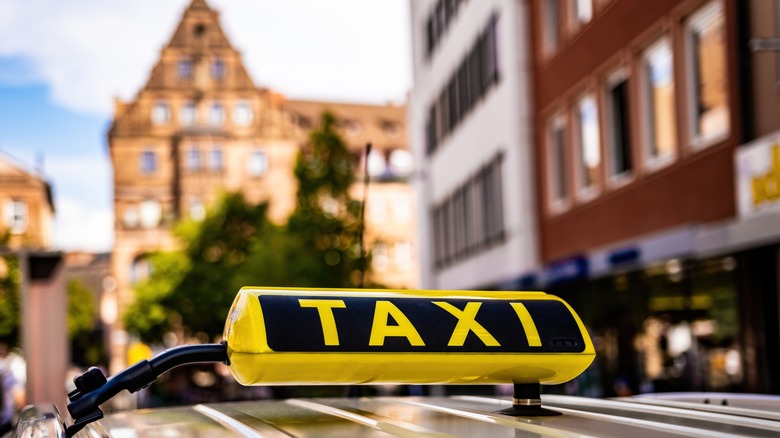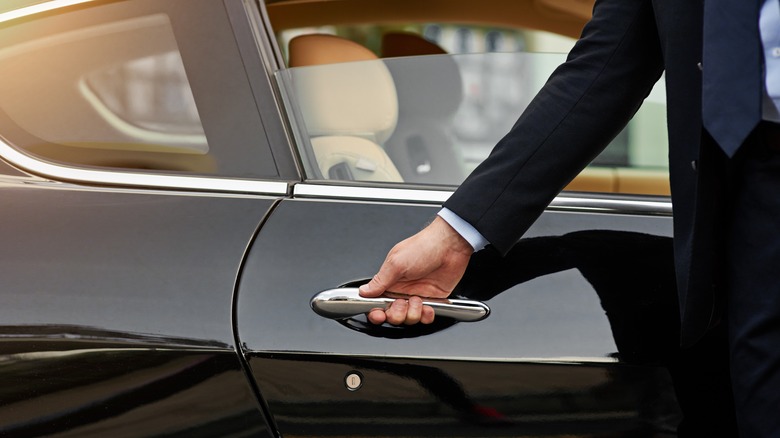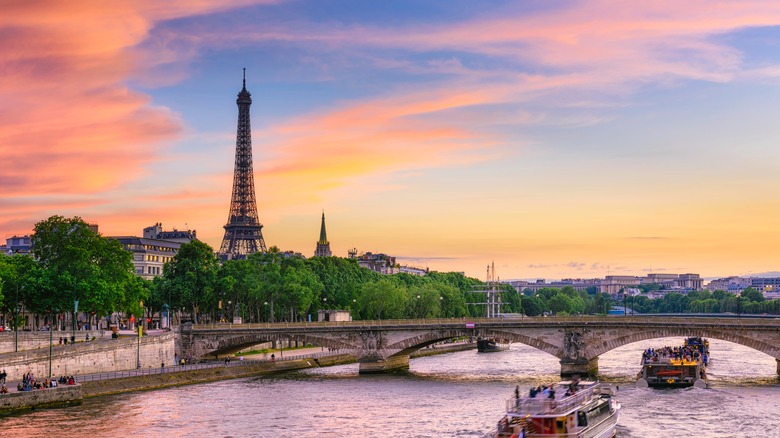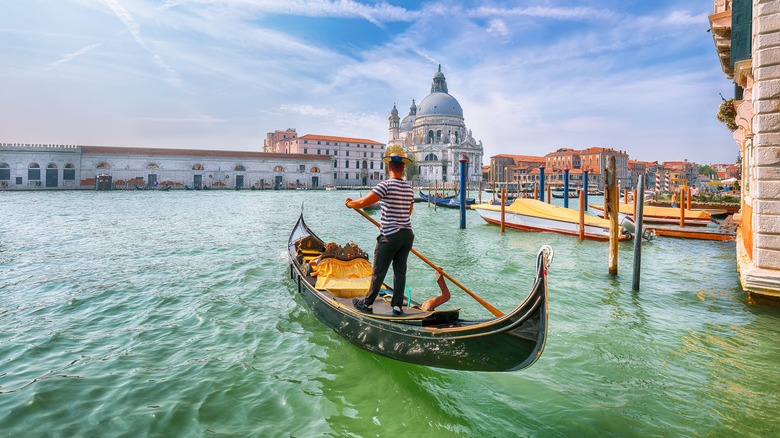What Rick Steves Says To Splurge On For The Best Trip To Europe
With an often-unfavorable exchange rate from dollar to euro, looking for places to save money on your European vacation is almost always a priority. However, all that penny-pinching can go too far. The whole point of traveling is to have new experiences and do things you can't do at home, and that's not always possible when you are worrying about every spend. Make sure you give yourself permission to splurge and enjoy yourself; you are on holiday!
Rick Steves has a long history of creating guides for travelers to Europe. Steves aims to share travel ideas that are "fun, affordable, and culturally broadening," and with that, he recognizes that spending a little more here and there can be worthwhile. Europe is huge, and its prices range from the eye-wateringly expensive to the surprisingly cheaper-than-home. When you are working out where to splurge and when to tighten your belt, you should take into account that a "splurge" hotel room in Nice at the height of summer is going to be a different price than opulent accommodation in Slovenia during the offseason, so even with some of the high-end options, there is room to save a buck or two. If you want to upgrade your trip, here are the things Rick Steves recommends splashing out on. You deserve it.
Centrally located hotels
One area where Steves recommends spending a little extra is on centrally located hotels or B&Bs. Particularly pertinent in cities where many of the areas of interest are close together, a hotel close to the action can help you experience the vibe of a place in a way you won't if you have to trek to a far-flung hotel every night. Additionally, it can save you money on transit costs if you choose to stay where the places you plan to visit are primarily within walking distance.
Google has a great feature that helps you find accommodation in a specific area. Starting from Google Travel, click on the "hotels" tab. In the search bar at the top of the Google Hotels page, enter an attraction or landmark you want to be near. On the right side of the screen, a map will populate with pins for each lodging. At the bottom of the map is a place where you can set walkability parameters of your choosing, and you can also do this with drive times. This tool can help you discover hotels in ideal locations, cutting down on time and travel costs on each day of your trip.
The Albergo Santa Chiara in Rome
Rick Steves shared some of his favorite places to stay on the Johnny Jet podcast. "When I'm in Rome, I go to Albergo Santa Chiara. For me, the key is to find a hotel that's kind of convivial, family-run, and beautifully located. The location is critical."
The Albergo Santa Chiara is conveniently located near the Pantheon and a five-minute walk from the Piazza Navona, the site of the stadium of Domitian, established in A.D. 80. The hotel, itself dating from 1839, is also about a 15-minute walk from the important archaeological site at the Roman Forum. If you're visiting the Eternal City, this Rick Steves-approved hotel is the perfect place to stay.
The hotel earns a healthy 4.5 rating on Tripadvisor, with many comments centering on its ultra-convenient location. Reviewer Barb D even name-checks the travel guru in her rave review: "This hotel is located in the heart of Rome yet in a quiet area. The room was clean and the staff was friendly. The breakfast buffet was delicious. We spent a lot of time researching hotels and found this one on the reliable Rick Steves tour book."
Guided walking tours
A fabulous walking tour is an excellent way to get the lay of the land. Think of it as a crash course in your destination, with the chance to learn more than you could from a standard guidebook. Rick Steves offers free audio walking tours for several cities and specific attractions through his Audio Europe app but still advocates for an on-the-ground guide as the best case, even though it costs more. An experienced tour guide will be familiar with the city and be able to share tips and insights and answer your questions, providing a kind of insider knowledge worth paying for.
When calculating costs, remember to factor in a tip for the guide. While tipping etiquette in European restaurants can differ from what you are used to, tipping a tour guide is generally expected and often makes up a large part of their income. If you happen upon a "free" walking tour, understand that you are free to pay what you wish — it isn't free of charge.
Food tours
Combining a walking tour and a satisfying meal is, you could say, a marriage made in heaven. The delicious and decadent food tour has been around forever, but according to Steves, these excursions are enjoying a moment in the European sun with exploding popularity. It's hard to disagree with the idea that moving from place to place, sampling the specialties of the house, is worth opening your pocketbook for.
You'll likely pay more than you would for either a simple walking tour or a sit-down meal at a restaurant, but a food tour offers the chance to sample a bunch of dishes at several eateries, plus learn about cooking techniques, ingredients, and culinary history. Food tours are the perfect way to try a little bit of a lot of food (usually, the combined bites add up to a generous meal's worth), especially if you are unfamiliar with the cuisine of a place and unsure if it will be to your taste. A food tour enables you to find what you like (or don't) without the commitment of ordering and paying for an entire dish.
Parisian food tours
In a mouth-watering article called "Food Tours: Europe's Moveable Feasts," Steves details a food tour he deems worth the expense that centered on the Parisian neighborhood of Marais. Steves prefers quick-moving small tours over those that move more slowly, noting that a larger number of people in the group makes it difficult to squeeze into small cafes or delis. On the food tour in question, the group visited several spots, gathering ingredients for a meal they enjoyed seated at a table under the open sky. Crisp, fresh-out-of-the-oven baguettes, buttery croissants, duck rillette, and a selection of cheeses were among the small bites the food tour enjoyed.
Another splurge Steves has come to love is cooking classes. Some combine the kitchen lesson with a trip to the market, accompanying the chef as they choose the freshest and most perfect ingredients. He shares how the French cook who led a class Steves took with his daughter brought them back after the shopping trip and "cooked it all up in her kitchen, all spiced with lots of tips, philosophy, and attitude." French cooking with a bit of personality? Mais oui!
Taxis and ride-shares
Public transportation is generally efficient in most major European centers, so finding your way to almost everywhere you need to go is cheap and relatively quick. Getting visitors to the hot spots is a priority in destinations that rely on tourism for a large chunk of their income, so it is generally pretty straightforward and sometimes even signed in English to make it even easier for visitors.
With such efficient and extensive bus, train, and metro systems across Europe, you may be fine relying entirely on public transit. Occasionally, you will find an attraction you want to visit that isn't quite as simple to visit using public transport only. Remember, your time is also worth money! As Steves puts it, "But time, like money, is a limited and valuable resource that needs to be spent smartly." He recommends paying for a taxi to travel to spots that can't quickly or easily be reached by bus or subway.
You may also want to opt for a taxi or ride-share late at night. Obviously, safety concerns aren't tied only to public transit, but sometimes getting directly home, especially in a strange city, feels best.
Private cars and drivers
Consider hiring a car and driver for a day trip. Sure, it feels like celebrity-level luxury, but depending on the time of year and where you are, it can be more reasonable than expected. If you are traveling with family or in a small group, the per-person rate is even better. Just as you must evaluate when taking a cab may be worth it for within the city, Steves recommends hiring a car and driver "to make the most of your time in sprawling destinations that lack good public transportation."
Destinations Rick Steves singles out as good options for a private ride are places where you will likely want to stop frequently to get out and explore. Trying to arrange this kind of tour to align with train or bus schedules can be a logistical nightmare. Renting a car and driving yourself can also be problematic. Not only do you have to contend with traffic, but the driver has to miss out on all the sightseeing.
The travel guru's choices for prime places to hire a car include trips to the somber World War II D-Day Beaches in Normandy, the stately and elegant chateaus of the lush Loire Valley, or the picturesque towns and lookouts along Italy's Amalfi Coast.
Good food
Rick Steves is a big proponent of the picnic, and his budget planning advice includes finding a market to stock up on local ingredients for a lovely picnic in the park. It's fast and cheap, and when bread and cheese are as good as they are in the Old World, a meal featuring these staples is almost guaranteed to hit the spot. It's also a fantastic way to get some fruits and veggies that may be few and far between on European restaurant menus, but when you are visiting the home of many of your favorite dishes, it might be time to sit down and pay for an upscale dining experience.
The senses of taste and smell are linked with memory, meaning a particular aroma can bring back an intensely vivid memory. It's a neat trick when you want to relive a holiday memory and arguably a good reason for paying a few extra dollars to help cement the flavor of a place in your remembrances. A luxury meal engages your senses in a very different way than a simple picnic. In the words of Rick Steves, "It's like taking your palate to a spa in a faraway place." Besides, great food is definitely worth paying for.
Leisurely dinners in France
In his blog, Rick extols the virtues of a leisurely meal he enjoyed that was worth the extra expense. In the post entitled "A Three-Hour Joyride in a French Restaurant," Steves shares the story of his splurge at a charming restaurant in the Loire Valley of France. He then wryly admits that it has taken him decades of travel to discover that a fine meal is more than supplying your body with the energy you need to keep traveling and that paying for such a meal can be worth it. Steves explains his lesson learned: "Now I can enthusiastically embrace a long, drawn-out dinner splurge as a wonderful investment of both time and money. Nowhere is this truer than in France."
An upscale meal in France is different from a typical American restaurant meal. For instance, dinner is served only at certain times (often 7 p.m. to 9 p.m.), making reservations somewhat of a necessity. Multi-course meals with smaller portions are more common than the North American standard of having several things on the same plate. Additionally, whereas American service is usually very outgoing and friendly (or "chummy," as Rick says), servers in France are often more reserved.
Splurging on a French meal seems a fabulous way to enjoy an evening. As Steves says, "I can't imagine a richer travel experience, one that brings together an unforgettable ensemble of local ingredients, culture, pride, and people."
Signature experiences
In his article "When to Splurge in Europe," Rick Steves shares how he spent three hours and a pretty penny on a taxi ride through Paris. The memory of the streetlights of the City of Lights was a sight he treasured and was well worth the expense. No one wants to come home broke, but it is arguably worse to come home and regret the things you missed out on. As Steves says, "Anything that puts me in touch with the pulse of a place finds room on my splurge list."
Not every signature experience is a popular tourist activity. A taxi tour probably isn't something that springs to mind when you think of Paris, unlike a visit to the Louvre or the Eiffel Tower. Getting in touch with the pulse of a place can be a bit subjective, but that is the joy of traveling. A history buff may love Berlin as much as a dedicated dance club scenester does, but for entirely different reasons. Both might say they are in touch with the city's ethos, but their splurge spending in pursuit of experiencing it would look nothing alike. Your trip is your trip.
Gondola Rides in Venice
Of all the splurges you can save up for to splash out on for your European vacation, Rick Steves gives a special nod to the gondolas of Venice. Yes, it may feel like a cliche, but after traveling all that way, are you really going to skip the iconic experience in the Floating City? Rick dubs it his "favorite splurge," so how could you go wrong? A gondola takes you winding through some of the smaller, quieter canals that are inaccessible any other way. Passengers cruise by the homes and palaces of Venitian families, inspiring them to imagine what changes have been wrought in the city since its founding over a thousand years ago.
Due to tightening regulations on big ships, cruise traffic in Venice is thinning a little, and a tourist tax for daytrippers is aimed at easing congestion even more. The city remains immensely popular, of course, but the evening is still a quieter time in Venice and prime time to snag a gondolier for a tour. Steves waxes poetic about the uniquely Venetian experience, saying, "Gliding through the dreamy tranquility of your own private Venice is an almost out-of-body experience — one you'll never forget."
Hiring a personal guide
Having someone who knows the city inside and out to show you around is a priceless experience. Scratch that; it does have a price, and that is the cost of hiring a personal guide. It's a splurge, but it is a Rick Steves-approved splurge!
Getting the inside scoop on a city, customized to your interests, is the main benefit of having a personal guide, but it's not the only one. Yes, they can give you tips on where locals eat and drink, but they can also share personal insights to deepen your understanding and appreciation for your destination. Seeing a new destination through the eyes of someone who has grown up in the city provides a more nuanced experience than just reading the brochures. An in-the-know guide can give you advice on what the can't-miss places are and (maybe more importantly) what isn't worth the hype. And if you find yourself in a jam, a local may have solutions a visitor wouldn't even think of! According to Rick Steves, if you only splurge on one thing on your European trip, this should be it.


